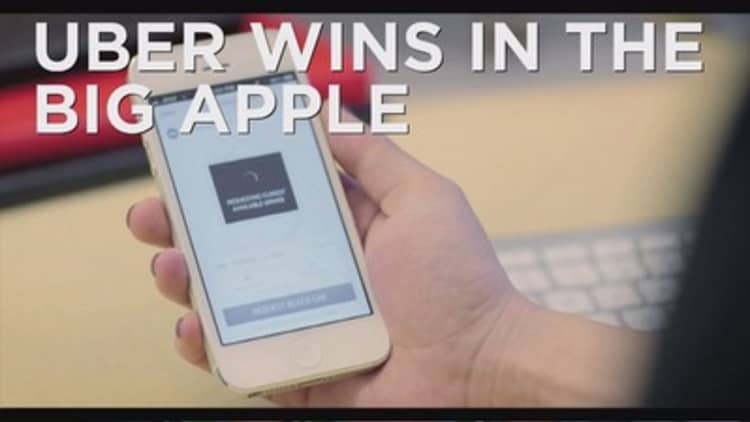
After a weeks-long battle between ride-hailing companies and New York City Mayor Bill de Blasio, an agreement between Uber and the city has been reached to not cap for-hire vehicle company growth in New York while a study on FHV impact in the municipality is conducted.
This comes after San Francisco-based Uber aired TV ads that feature drivers sharing how the cap would impact their livelihood. The company also added a "de Blasio feature" to the Uber app, which displayed that fewer available cars and longer wait times would be likely under the proposed growth limits.
Read More Taxi drivers fight back against Uber and Lyft
"We're pleased to have reached an agreement with Mayor de Blasio's administration and the City Council to collaborate on a joint transportation study and to work together on ways to continue expanding economic opportunity, mobility and transportation access in the city," Uber's general manager for New York City, Josh Mohrer, said in a statement.
The proposal that has been tabled would have temporarily capped the growth of Uber and other for-hire vehicles in New York City through April 2016. Instead, a bill is expected to be voted on Thursday that would authorize a study on how FHVs have impacted traffic, air quality, noise and public health. As part of the agreement, Uber will provide data for the study.
New York City is a major market for app-based ride-hailing companies. But the city is under pressure from the Taxi and LimousineCommission, or TLC, as taxi medallions have lost some 20 percent of their value since 2011.
As context, there are roughly 13,500 yellow taxis on the road in the city—a capped number—and 63,000 for-hire vehicles, according to the TLC. In other words, there are roughly four or more for-hire cars for every cab in NYC.
Read MoreJeb Bush, Uber and the new American contract worker
"We look forward to a real partnership with the for-hire vehicle industry along with genuine data-sharing that will give us a better picture of their impact on our streets," New York City Council Speaker Melissa Mark-Viverito said in a statement.
Lyft cheered the agreement, as the company was also lobbying against an FHV cap in New York.
"This is good news for consumers and drivers, and we thank the City Council for listening to our concerns about removing carpooling options, which we see as part of the solution to traffic congestion. We will continue working together with the City Council and the TLC to build a more sustainable future for New York," David Mack, Lyft's director of public affairs, said in a statement.


